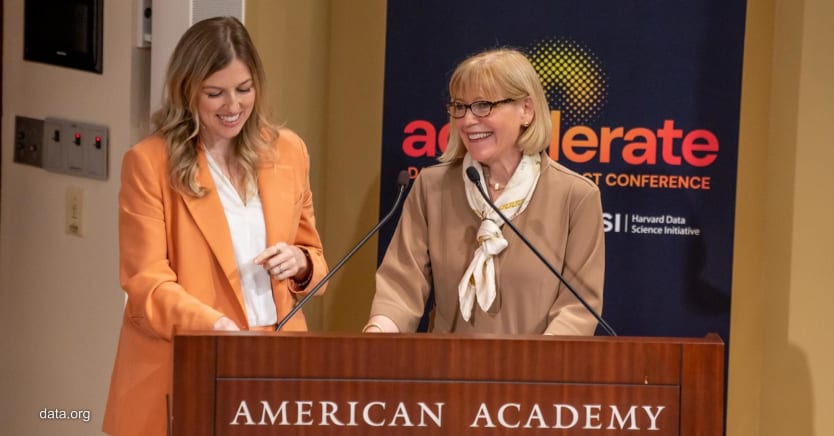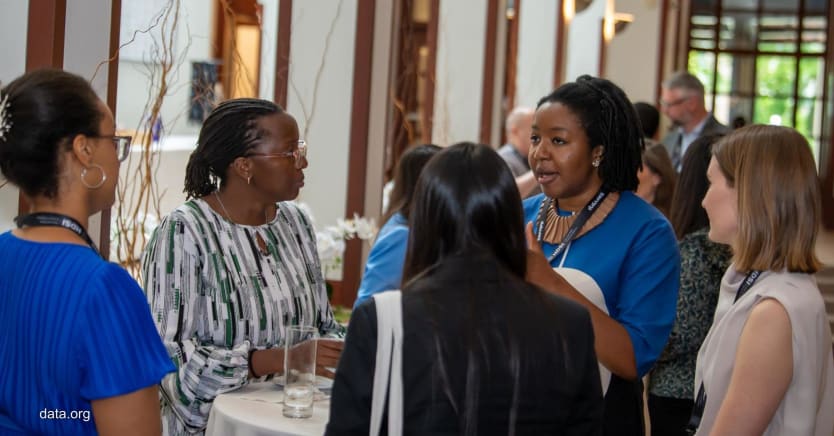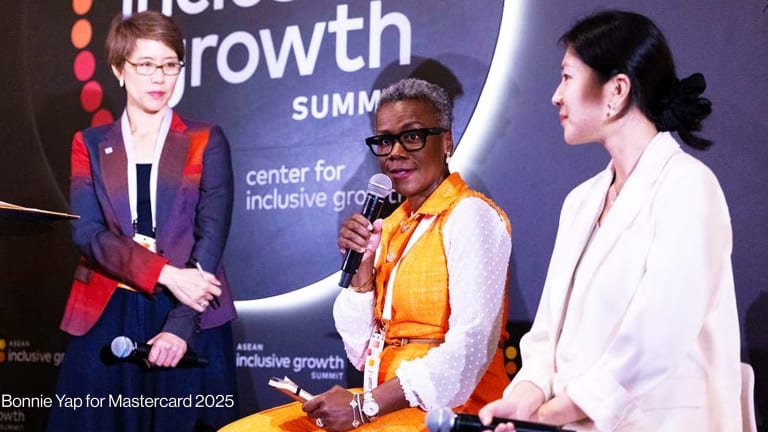
While innovative technology is essential to accelerating the fields of data and AI for social impact, it’s human-to-human interaction that leads to the cross-sector and cross-border partnerships needed to enact meaningful change, according to Perry Hewitt, data.org’s chief marketing and product officer.
“Bringing people together is tremendously powerful, and a lot of the power is in people huddled over high tops, engaging with one another, and exchanging ideas and opportunities for collaboration,” Hewitt said of the company’s inaugural Accelerate: Data and AI for Social Impact Conference.
In 2024, the event convened global academic institutions, social impact organizations, philanthropy, and industry partners in Cambridge, Massachusetts, to discuss leveraging data and AI to mitigate and adapt to climate change.
Aiming to build on its success, data.org is partnering with Pontifical Javeriana University to bring the conference to Bogotá, Colombia, in June 2026 to explore the opportunities, challenges, and pathways to advance data and AI-driven solutions for social impact in financial inclusion and public health — areas “that have a huge impact on people's overall well-being.”
“We think a lot about how we can be globally informed but locally led,” Hewitt said. “We work with local partners, build trust, and identify community needs, then we use that learning to distill and share insights and actions to inform the global field.”
Speaking to Devex, Hewitt shared what she hopes to achieve at Accelerate 2026, the growing importance of centers of innovation, and how data.org is working to build a more prosperous future with data and AI.
This conversation has been edited for length and clarity.
What do you have in store for the 2026 Accelerate Conference, and can you explain why you chose Bogotá as the host city?
Bogotá is an incredible place — the food, culture, natural beauty, people — and when you have a partner like Pontifical Javeriana University, it was an easy call. The university is committed to social impact and shaping future leaders in the field. At data.org, we have five Data Capacity Accelerators, with Javeriana leading our Latin America Accelerator. They’ve developed a lot of training with us, and our partnership continues to be really valuable to the data.org ecosystem.
For the next conference, we’re taking everything that people loved about the Accelerate Conference in 2024 and trying to supercharge it for 2026. Our themes are going to be focused on financial inclusion and public health — areas that have a huge impact on people's overall well-being.

In 2024, you hosted the inaugural Accelerate Conference in partnership with the Harvard Data Science Initiative in Cambridge. As the conference moves to Bogotá, what role do centers of innovation play in advancing data and AI for social impact?
With Accelerate 2026, we’re moving from one vibrant innovation ecosystem to another, connecting Cambridge and Bogotá — two cities that have both higher education prowess and thriving tech scenes. There is a ripple effect that offers a lot of possibilities: You start in a center of innovation, bring people together for solutions-oriented conversations, a lot of good local talent, and that drives progress. Positioned as a connector and a catalyst in these centers, data.org identifies what works, what “great” looks like, and then thinks about how we bring these practices to the rest of the world.
Looking back at the Accelerate Conference in 2024, were there any lessons you took away on how to best turn ideas into action in the field of data and AI for social impact?
Much of it lies in acknowledging that we don't have all the answers. There are a lot of well-intentioned people who want to leverage data and AI for good. But if you’re approaching it from the outside looking in, there are so many risks and unintended consequences. It's hard to lead from that blind spot.
The 2024 event reinforced how important it is to bring together local leaders who are doing the work with the philanthropists and private sector tech companies that are looking to fund it. It’s everyone coming together as open-minded partners to consider what we can get done together: Creating solutions and deploying them in a way that makes them sustainable in the local context.
Are there any success stories you’d like to share that may have their roots in the 2024 event?
The biggest seed we planted at Accelerate 2024 that’s come to bear fruit today is the Artificial Intelligence to Accelerate Inclusion, or the AI2AI Challenge, in partnership with the Mastercard Center for Inclusive Growth. This challenge called for organizations with existing AI solutions seeking scale to accelerate financial inclusion and social impact.
We added five incredible organizations to our roster of challenge awardees: Quipu, which bridges the financial inclusion gap for small businesses in Colombia; IDinsight, which upskills health extension workers in Ethiopia; Buzzworthy Ventures’ BEEKIND, which is revolutionizing the beekeeping ecosystem in India; Link Health, which increases access to federal benefits in the U.S.; and, globally, the International Rescue Committee, which provides critical information to people displaced by conflict, disasters, poverty, and violence.
What are some of the biggest challenges or barriers you see to scaling social impact in using data and AI?
It will not surprise you if I say resources. Social impact organizations are already resource-constrained in a time of uncertainty. It’s hard to know: Do we purchase or build tools to keep up with data and AI? How do we not only secure the resources but deploy them effectively with new technology?
Another challenge is that the data available is often pulled from high-resource languages, so there are whole segments of the population that are overlooked. AI models today are being built on English and Mandarin. So, until AI can speak and read a more representative set of languages, its potential will remain limited.
What does the future of training look like in the field of data and AI for social impact? Are there any data.org initiatives in the training space that are particularly exciting?
I think it’s about partnerships and exploring different modalities — both of those are equally important when considering the future of training and engagement. At data.org, we’ve surpassed 100,000 purpose-driven data practitioners trained as part of our “march to one million” goal of training 1 million data practitioners by 2032. To meet this goal, we need to look not only at a rigorous curriculum and hands-on training, but also how to create force multiplier opportunities to expand the reach and access of this training.
We have a partnership with the Indian government, for example, which has an extensive curriculum and coursework on a platform that reaches more than 7 million civil servants. There’s tremendous potential to scale with an existing training model, and that is a path we are pursuing with multiple partners. That’s the power of partnership.
Looking ahead, what does success look like on the other side of the 2026 Accelerate Conference?
I would like cross-sector leaders from philanthropy, academia, private sector tech, and social impact organizations to walk out of Accelerate energized by the innovation in the room, feeling laser-focused on implementation, and strengthened by an expanded network of action-oriented people committed to social impact.
Five years in, our work at data.org has accelerated significantly. We want the same acceleration for the people and organizations doing the hard work on the ground, and that’s exactly what they can expect if they use our resources, learn from the best practices we’ve identified, and tap into the powerful network we’ve cultivated.
Learn more about data.org’s five years of impact and access practical data and AI tools, resources, and solutions in our monthly newsletter.








